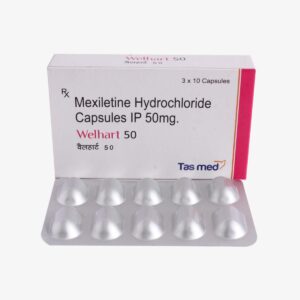MEXILETINE
MEXILETINE: Mexiletine is a medication used to treat certain types of irregular heart rhythms, specifically ventricular arrhythmias. It belongs to a class of drugs known as antiarrhythmics.
The mechanism of action of mexiletine involves blocking sodium channels in the heart muscle, which helps to prevent abnormal electrical activity and stabilize the heart rhythm. This medication has a local anesthetic effect on the heart, similar to lidocaine.
The usual starting dose of mexiletine for adults is 200 mg taken orally every 8 hours. Depending on the individual’s response and tolerability, the dose may be increased to a maximum of 1,200 mg per day. It is important to follow the dosage instructions given by the healthcare provider.
Like all medications, mexiletine can cause side effects. The most common side effects include gastrointestinal symptoms such as nausea, vomiting, and stomach pain. Other possible side effects include dizziness, unsteadiness, tremors, and headache. It may also cause allergic reactions in some individuals, which can present as rash, itching, swelling, or difficulty breathing.
In rare cases, mexiletine may have serious side effects such as heart rhythm abnormalities, liver toxicity, and blood disorders. Therefore, it is necessary to closely monitor patients taking mexiletine and adjust the dose if needed.
It is important to note that mexiletine should not be used in patients with certain heart conditions, such as heart block or severe heart failure. It may also interact with other medications, so it is crucial to inform the healthcare provider about all other medications being taken.
Overall, mexiletine is an effective antiarrhythmic medication that helps restore and stabilize normal heart rhythms in individuals with ventricular arrhythmias. Nevertheless, it should only be used under the supervision of a healthcare professional who will closely monitor its effects and potential side effects.

